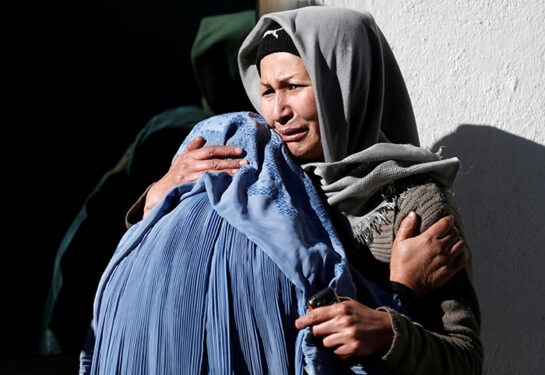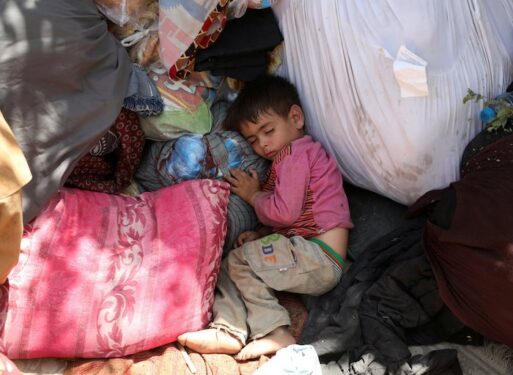
By Inés San Martín
ROME (Crux) — As the Taliban reclaim power over Afghanistan, a question in the mind of many rank and file Catholics is how can they help. Yet the situation is still so convoluted, even Caritas Internationalis, the largest network of Catholic charities is grappling to answer the same question.
Crux spoke with the head of this papal charitable organization on Tuesday, two days after the Taliban took over Kabul and officially took over the government of this Middle Eastern country, to discuss what can this NGO do during the crisis.
[Related: Caritas Italy, Jesuits Suspend Activities in Afghanistan]
The short answer is “wait and see,” since one of the biggest issues to address is to guarantee that Caritas, through local NGOs, can, in fact, help.
“We’re heading to a worsening of the humanitarian crisis, where I don’t know if humanitarian workers will be allowed to work freely, particularly women,” Aloysius John told Crux.
“The work of charity can always be a means for dialogue, and this is the way we have to look at it,” he added. “We’re waiting to see what we can do, but we have some experience on this and we will continue to do our best in order to bring support to the people.”
John spoke with Crux over the phone on Aug. 17. What follows are excerpts of that conversation.
Crux: How would you describe the situation in Afghanistan right now?
John: The situation in Afghanistan today is something we were able to envisage a long time ago when the US decided to withdraw its troops. Today, the Afghan people have been left to their own, alone, and there is a huge, two-fold crisis: On the one hand, there is a political crisis, and on the other side, a humanitarian crisis.
We’re heading to a worsening humanitarian crisis, where I don’t know if humanitarian workers will be allowed to work freely, particularly women.

Our main concern today is to see what we can do for the people on the move, what we can do from a humanitarian point of view, as the humanitarian crisis continues to worsen in Afghanistan.
People today are leaving en masse, so there will be an important increase in displacements and it will be very difficult to control this, and we also have to see what can be done to guarantee that people have access to basic services.
An estimated 99% of the population is Muslim. Why is Caritas, a Catholic NGO, worried about the humanitarian crisis in this country?
One of the key founding principles of Caritas Internationalis is to help people irrespective of caste, religion, or creed. Caritas puts this into application because when it comes to human suffering, there is no Christian, Muslim, or Hindu, there is a human person. And Pope Francis, in his encyclical Fratelli Tutti, has brought it out very clearly that we are called to respond to any human community that is suffering.
If you look at this from the perspective of the Good Samaritan, he asked no questions. He was moved into action because of the condition of the poor man on the side of the road. Today, seeing the sufferings of the Afghan people, what moves us to action is the human suffering, their dignity, and we will try to do everything in our hands to help them “keep their heads above water.”
Is there anything Caritas can do for Afghanistan today?
Caritas was acting in different ways in Afghanistan, and today, I think there will be a need for Caritas member organizations to come together and map our action plan. We’re going to have crisis meetings to see what should be done in this context, wherein we can agree to bring support to the people. As of now, we’re waiting to see how the situation evolves and what is the best way for us to help.
There are local NGOs on the ground, and what we can do depends to a great extent on whether these NGOs can continue their work. The United Nations has asked the NGOs to stay there, and we will see what we can do to work together with the NGO network and with the UN. We will see what protection will be given to the NGOs, explore the space for dialogue with the Taliban and see how we can help the Afghans.
We need to be careful that charity not be misunderstood or misinterpreted and becomes a source of complication and even contention.
The crisis meetings will be held to make sure we find the best way to be of help.
Beyond the fact that the Taliban are reclaiming power in Afghanistan after the withdrawal of U.S. troops, they have long been powerful in other countries where Caritas helps, such as Pakistan. Do you have hopes, based on the experience, to be able to work with local NGOs?
I believe that human suffering should lead us to be clear about our solidarity. If they are in power, we have to dialogue with them, there’s a need for it, and taking human suffering into consideration, we have to see how the local NGOs get into dialogue with the new government, to have an honest, clear idea of what can be done to carry out the humanitarian imperative.
For me, it’s premature to say to what extent we’ll be able to work or not. But there are some cases, for example, in Iran, where we have been able to work with the different communities, placing human suffering at the forefront, with charitable work becoming a means for dialogue. In Pakistan, Caritas Pakistan is in constant dialogue with different Muslim leaders at the local level and with the government at the national level to carry out its mission. The work of charity can always be a means for dialogue, and this is the way we have to look at it.
We’re waiting to see what we can do, but we have some experience on this and we will continue to do our best in order to bring support to the people.
Do you think that Pope Francis’ efforts when it comes to interreligious dialogue can be particularly helpful in this situation?
Pope Francis’ gestures and words are prophetic: He brings human dignity to the forefront using the parable of the Good Samaritan. In it, there’s a clear call to action, out of compassion and understanding of human suffering.
The challenge which Caritas has to address today is to see how we can engage in dialogue and address with compassion the humanitarian imperative. Caritas will continue the dialogue on the basis of our call to respond with compassion to the suffering of the most vulnerable.
We are not responding to a Muslim, a Hindu, or a Christian, we are responding to a human person who is suffering. And this is where we need to bring our value of universal, unconditional love for the poorest and those who are suffering.
Not because they are Christians or Taliban, but because they are human persons. I hope this will serve as a basis for unity in dialogue. Now more than ever, we need to put into application the values of Fratelli Tutti: how do we enter into dialogue, even with those whom we think we cannot? How do we transform our charitable efforts into a space for dialogue?
Editor’s Note: For full coverage on the current status of Afghanistan, head to this link: Crisis in Afghanistan
